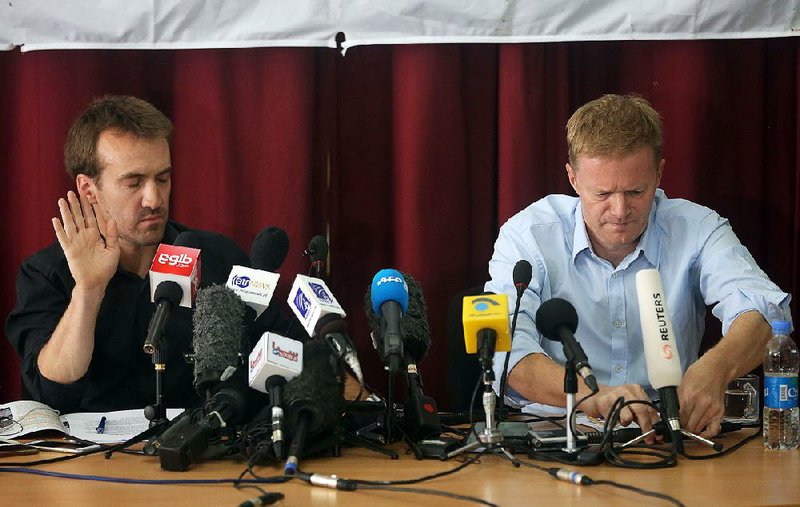KABUL, Afghanistan -- A day after President Barack Obama apologized for a U.S. airstrike that killed at least 22 people at a hospital run by Doctors Without Borders in northern Afghanistan, the medical charity said Thursday that it is continuing to press its demand for an independent investigation of the attack.
RELATED ARTICLE
http://www.arkansas…">Taliban said open to peace talks
Saturday's airstrike took place as Afghan forces were fighting to retake the strategic northern city of Kunduz, which was overrun and briefly held last week by the Taliban.
Obama on Wednesday apologized to the organization and said the U.S. would examine military procedures to look for better ways to prevent such mistakes.
But scarce details on the erroneous strike have fueled growing condemnation by the charity and other aid groups. Along with a dozen hospital staff members, 10 patients were killed in the strike.
Speaking to reporters Thursday in Kabul, the charity's general director, Christopher Stokes, reiterated the group's demand for the investigation, saying that it would be important and set a precedent for nongovernmental organizations working in conflict zones worldwide.
Stokes said Doctors Without Borders wanted the Swiss-based International Humanitarian Fact-Finding Commission -- which is made up of diplomats, legal experts, doctors and some former military officials from nine European countries, including the United Kingdom and Russia -- "to get the facts of what happened, the truth."
Created after the Gulf War in 1991, the commission has never deployed a fact-finding mission.
Stokes said Doctors Without Borders -- a Nobel Peace Prize-winning organization that provides medical aid in conflict zones -- is awaiting responses to letters sent Tuesday to 76 countries that signed the additional protocol to the Geneva Conventions, asking to mobilize the 15-member commission.
For the commission to be mobilized, a single country would have to call for the fact-finding mission, and the U.S. and Afghanistan -- which are not signatories -- also must give their consent.
"It would show a distinct lack of courage if none of the 76 signatories come forward," Stokes said.
In Kunduz, the charity's hospital was no longer operational. Of the 105 patients who were there at the time of the airstrike, nine have yet to be accounted for; and of the 461 staff members, 24 are still missing, said Guilhem Molinie, the charity's representative in Afghanistan.
He added that Doctors Without Borders believes there are still 24 bodies in the debris of the building.
Government forces continued to battle Thursday to clear insurgents from Kunduz areas. Humanitarian supplies were still not reaching the city in adequate quantities, said Sarwar Hussaini, a provincial police spokesman. Police were helping with some food distribution, he added.
House-to-house searches continue as securing forces seek to eliminate remaining pockets of insurgents hidden in the city, said provincial police chief Mohammad Qasim Janghalbagh. He said searches had led to the Thursday arrest of 13 armed Taliban.
The United Nations' office in Kabul said Thursday that the humanitarian situation in Kunduz is deteriorating, with many residents lacking access to food and water. There were conflicting reports on whether the airport, the scene of fierce battles when Taliban overran the city, was open.
According to U.N. estimates, there were up to 150,000 people remaining in Kunduz, a city with an official population of 300,000.
NATO is open to keeping more troops in Afghanistan than initially planned after 2016, but officials said Thursday that the alliance is waiting for the Obama administration to announce its decision on a larger military presence there.
U.S. Defense Secretary Ashton Carter said he discussed the matter with NATO allies Thursday and asked them to consider abandoning their earlier plans to cut troop levels in Afghanistan to just a small presence at the end of next year.
"I have asked all of the NATO partners to remain flexible and to consider the possibility of making adjustments to the plan [to leave 1,000 troops in Afghanistan after 2016], which is now 2½ years old, for the presence in Afghanistan," Carter told reporters during a meeting of NATO defense ministers. "I was very pleased to hear ministers of defense from our NATO allies reaffirm their commitment, discussing not whether but how to continue the mission in Afghanistan."
German Defense Minister Ursula von der Leyen, speaking to reporters at the NATO meeting, said the alliance should not set timelines, but should focus more on how things are going in Afghanistan. She said NATO needs to "look at how we go forward and whether we should stay longer."
NATO Secretary-General Jens Stoltenberg said that the alliance's decisions will be made based on a detailed security assessment that will determine the size of the force, where they will be based and how long they will stay. He predicted a decision in the coming weeks, but other officials suggested Obama could make his plans known fairly soon.
Information for this article was contributed by Humayoon Babur, Lolita C. Baldor and Deb Riechmann of The Associated Press.
A Section on 10/09/2015
